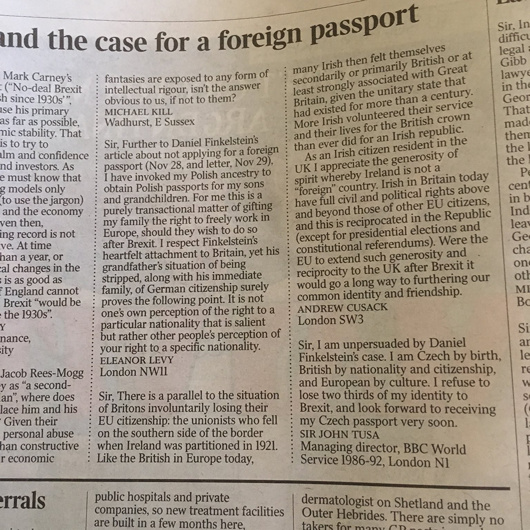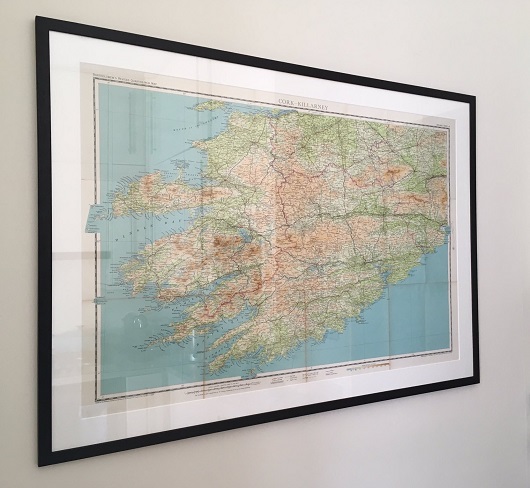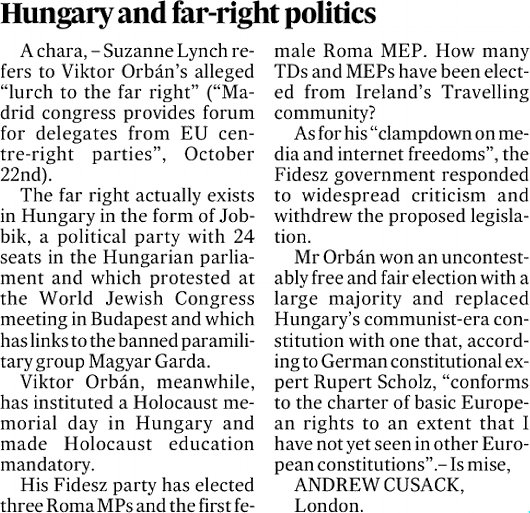Letter to the Editor
About Andrew Cusack
 Writer, web designer, etc.; born in New York; educated in Argentina, Scotland, and South Africa; now based in London.
Writer, web designer, etc.; born in New York; educated in Argentina, Scotland, and South Africa; now based in London. read more
News
Blogs
Reviews & Periodicals
Arts & Design
World
France
Mitteleuropa
Knickerbockers
Argentina
The Levant
Africa
Cape of Good Hope
Netherlands
Scandinavia
Québec
India
Muscovy
Germany
Academica
Letter to the Editor: The Times
There has been a distinct increase in the number of missives sent out from Huis Cusack to editorial offices across Europe and beyond as part of my slow but inevitable transformation into “Disgruntled of Tunbridge Wells”. It all started with an extremely pedantic letter to the TLS regarding PG Wodehouse, banking, and the collapse of the rupee that was printed in October 2008.
It escaped my notice at the time but it turns out the editors of The Times of London were short of anything decent to print last November so stuck one of my letters in. Very kind of them.
Sir, There is a parallel to the situation of Britons involuntarily losing their EU citizenship: the unionists who fell on the southern side of the border when Ireland was partitioned in 1921. Like the British in Europe today, many Irish then felt themselves secondarily or primarily British or at least strongly associated with Great Britain, given the unitary state which had existed for more than a century. More Irish volunteered their service and their lives for the British crown than ever did for an Irish republic.
As an Irish citizen resident in the UK I appreciate the generosity of spirit whereby Ireland is not a “foreign” country. Irish in Britain today have full civil and political rights above and beyond those of other EU citizens, and this is reciprocated in the Republic (except for presidential elections and referendums).
Were the EU to extend such generosity and reciprocity to the UK after Brexit it would go a long way to furthering our common identity and friendship.
ANDREW CUSACK
London SW3
Of course I am as poblachtánach as anyone else — Up Dev and all that — but one does appreciate the difficulty of those Irish who also identified as British once the Free State was erected. But then given my background (Irish New Yorker educated there, in Argentina, Scotland, and South Africa, resident in London) I don’t see any problem with a multiplicity of overlapping identities. All the same, when people imply they will somehow mystically cease to be European come 29 March it just makes them look silly. Great Britain has always been a European country and always will be.
I blame Ulster, the French Revolution, and the Fall of Man.

Observations
All those interested in the history of the workers’ struggle would have enjoyed a letter to the editor printed in last week’s Observer.
Floreat Etona, left and right
Alex Renton is correct when he points out that the 20 old Etonian MPs currently sitting are all Tories, but this is far from usually the case (“Our educational apartheid laid bare”, Books, New Review). The first OE to be elected a Labour MP was in 1923, and the party consistently had OE representation on its benches from then all the way to 2010. Even Clement Attlee’s transformative postwar Labour government included two old Etonians: Hugh Dalton as chancellor of the exchequer and Frederick Pethick-Lawrence as India secretary.
Andrew Cusack (Conservative, non-OE)
London SE1
Of course, no one actually reads the Observer, so it went entirely unnoticed.
I have acquired a dangerously successful rate of my pedantic missives being printed in periodicals. The editors of the Irish Times, Times Literary Supplement, Catholic Herald, and even the Tablet have all been guilty of lapses in judgement in this regard.
The McGillycuddy of the Reeks

How lovely to see a member of the Gaelic nobility – in this case, the McGillycuddy of the Reeks – having a letter printed in the newspaper (Daily Telegraph, Letters, Wednesday 20 December 2017).
His title is somehow the most fun of all the Chiefs of the Names, though not all bearers of the chiefdom have found it amusing. In the early years of the BBC, the ‘Green Book’ instructing comedy producers what they could and could not get away with contained the instruction ‘Do not mention the McGillycuddy of the Reeks or make jokes about his name’. Clearly a protestation had been made.
Looking at the map of Kerry on my kitchen wall, the eye often drifts to McGillycuddy’s Reeks themselves, the “black stacks” amongst which can be found Corrán Tuathail, Ireland’s tallest mountain.

Letter to the Editor
A letter to the editor printed in this week’s edition of The Tablet:
Brendan Walsh’s report (“Heythrop’s fate”, 17 September) of a senior academic suggesting that the demise of Heythrop was an episode in a long struggle between “outward-facing, inquisitive, challenging” theology on one side and “inward-looking, submissive, unquestioning” theology on the other is telling.
Positing such a simplistic binary split between Enlightened Me and Poor Ignorant You is patronising to those attempting to live out the radical beauty of the Christian life in tune with Catholic teaching. It’s not surprising that an institution with academics holding this view is entering its death spiral, while religious communities that don’t consider basic orthodox belief as optional are bursting at the seams.
Few things are more challenging – and more rewarding – than faithfulness; while some cling to clapped-out heterodoxies and managed decline, the rest of the Catholic world has moved on.
ANDREW CUSACK
London SW1
Letter to the Editor
SIPPING a postprandial Coke last week while flipping through the Irish Times, my wandering eye was drawn towards that newspaper’s report on the Madrid congress of the European People’s Party, the grouping of Christian-democratic and centre-right political parties across the European continent (Madrid congress provides forum for delegates from EU centre-right parties, Suzanne Lynch, Irish Times, 22 October 2015). The correspondent first elucidates some of the purpose of these pan-European gatherings before going on to summarise a number of the issues raised. She ends, however, on a bit of a downer by describing Hungarian Prime Minister Viktor Orbán’s “lurch to the far right”, evidenced by his “clampdown on media and internet freedoms, apparent support for the death penalty and hardline approach to refugees”.
This breezy litany of crimes is little more than shoddy journalism. The alleged “clampdown” refers to proposed internet legislation which has been withdrawn while other media laws requiring balance reflect the U.S. broadcasting rules rescinded under Ronald Reagan. The “apparent support” for capital punishment is another damp squib: Orbán called for it to be debated as intellectual speculation — a canny “dog-whistle” political move to gain votes without requiring any legislative action or serious challenge to the E.U. ban on the death penalty. (It was abolished in Hungary at the fall of communism and there are absolutely positively no government plans to bring it back.)
The refugees allegation was the most interesting, however. As it happened, I had attended a small meeting of British MPs and Hungarian foreign ministry officials the day before Ms Lynch’s report was printed. The Welsh MP David Davies gave his first-hand account of visiting the refugee camps near the Hungarian-Serb border and reported that refugees were being well-looked-after, with the quality of the facilities on the whole at least as good as when he was in the British Army, often better. An advisor from the Hungarian Foreign Ministry briefed us on the general situation, which has calmed down immensely since the Serb border has been more or less closed. He noted that broadcast media across the continent showed footage of Budapest police’s treatment of migrants gathered at the railway station without pointing out that the police were responding to violent attacks from a small minority of migrants.
Proprotionate self-defence for officers of the law is the norm across Europe, but this has mattered little when it comes to depictions of Hungary: the bien-pensant official groupthink is that anything Hungary does is wrong, so long as Fidesz is in power. Luckily some voices of dissent have emerged. The novelist Tibor Fischer — no conservative — described in The Guardian the media treatment of Hungary as “hysterical” and “ignorant nonsense”.
Anyhow, I felt obliged to send off my “Disgusted of Tunbridge Wells” to the Irish Times and it’s very good of their letters staff to print a diverging (if abridged) opinion. The last letter to any editor I succeeded in having printed was in the Times Literary Supplement in 2008 about P.G. Wodehouse’s career in banking at H.S.B.C. Who knows what the next shall bring…

The TLS Online
I hope that one byproduct of the Times of London moving to a new website is that the Times Literary Supplement will finally get one of its own. Other Times spinoffs like Times Higher Education and the Times Education Supplement have them, so why not the jewel in the crown?
Also, I’d hate to see my pedantic letter to the editor of October 1, 2008 available only to paying subscribers (see here, scroll down to ‘Banking’, and ignore erroneous spacing).
Come on, TLS. If the LRB can do it, so can you.
Search
Instagram: @andcusack
Click here for my Instagram photos.Most Recent Posts
- Sag Harbor Cinema March 26, 2025
- Teutonic Takeover March 10, 2025
- Katalin Bánffy-Jelen, R.I.P. March 3, 2025
- Substack Cusackiensis March 3, 2025
- In the Courts of the Lord February 13, 2025
Most Recent Comments
Book Wishlist
Monthly Archives
Categories


